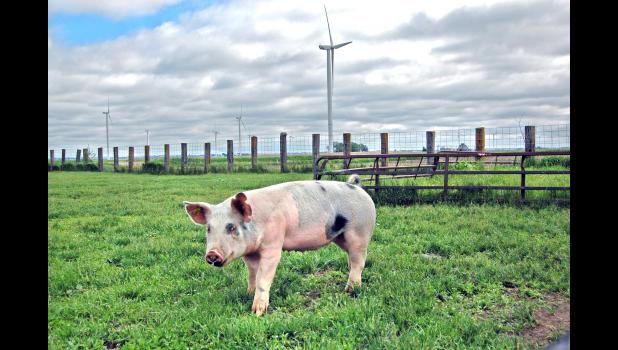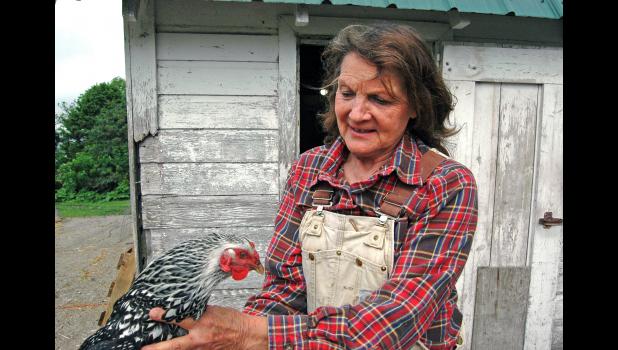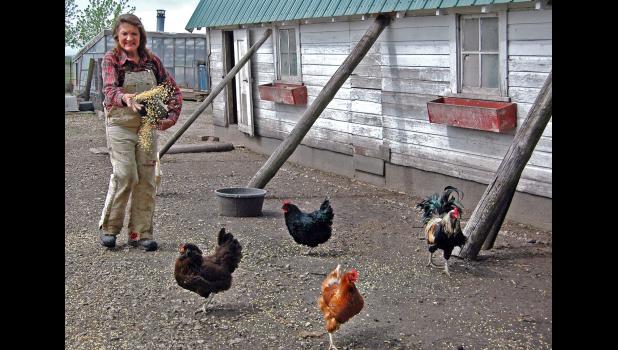UNBROKEN
By ANDREW MCGINN
Hugh Gannon can’t imagine not owning his own pigs.
The feeling, actually, is mutual.
“They own us,” Gannon, 59, joked during a recent break from chores at the family homeplace northwest of Rippey. “We own them one day: when they go across the scale.”
Gannon and wife Denise, who’ve worked side-by-side from daylight to dark most every day for four decades, have become something of a rare breed in farm country over the past 30 years.
Since 1990, according to the U.S. Department of Agriculture, the number of farms with hogs has declined more than 70 percent.
Those remaining hog operations are likely to be vastly bigger, with heads numbering in the thousands, and the operators are apt to be contract feeders — farmers who fatten hogs under contract to a corporation, lessening their financial risk.
That rapid shift enabled the United States to become a net exporter of pork internationally for the first time in 1995, but with many farms now operated like factories, there’s simply no margin for error — or a pandemic.
That much is now painfully clear.
When meatpackers recently began to be stricken with COVID-19, it touched off a series of events that led Tyson Foods chairman John Tyson on April 26 to announce, “The food supply chain is breaking,” a shocking admission in the form of a full-page ad in The Sunday New York Times and as a blog post on the company’s website.
U.S. Sen. Chuck Grassley, R-Iowa, later shared a May 14 story by the Times detailing the fallout: to avoid overcrowding, producers are gassing and shooting pigs, killing chickens by the millions and smashing eggs.
Corporate processors and contract producers are indeed in dire straits, but does that mean the food supply chain is breaking?
The Gannons, for one, may disagree.
“It’s terrible,” Hugh Gannon observed, his heart going out to bigger producers forced to “depopulate” livestock because of plant slowdowns. “For that producer, that’s got to be horrible.”
“Is it an example that we’re raising too many hogs?” he asked.
Visiting his farm, though, is like stepping through a time portal, with gilts (female pigs that have yet to farrow) given free rein in the grass and boars lumbering about in the open air.
The only hogs of his that will be killed will be eaten, because the Gannons are also among a dwindling number of local farmers who sell direct to the public.
Their primary customer is usually the Tyson pork processing plant in nearby Perry — where an outbreak of COVID-19 was widely reported May 5 — but with prices there so low, the Gannons are content to continue taking orders from a public concerned for the first time in their lives about possible shortages of meat.
“I never thought our country would come to something like this,” Hugh Gannon confessed.
When illness began wreaking havoc on the big processing plants, Denise Gannon’s phone blew up — within just days, nearly 100 of their hogs were spoken for.
Because they own their own hogs, and because they have enough space for them, they also have the flexibility to take hogs to a local processor (itself among a rare breed) like Dahl’s Custom Meat Locker in Bagley.
Unfortunately, Denise Gannon said, all of their locker dates are booked until September.
Hogs are, however, available immediately if the customer can find a locker date somewhere — or wants to butcher it at home.
“If you take them to Tyson, you’re giving them away,” Hugh Gannon said of his hogs. “I don’t want to give my hogs away.”
It’s unclear how the buying habits of consumers will change — if at all — once the pandemic subsides, but local chicken farmer Mary Hillman hopes that people will give more consideration to where and how their meat is produced.
The Junction Twp. resident, a former East Greene school board member, refutes the idea that the food supply chain is breaking.
“It is not breaking,” Hillman said.
She sells poultry and eggs to the public, and is planning to butcher 470 chickens in the coming days. Not all are spoken for.
“I think what they’re doing is trying to drive up the price,” said Hillman, who’s been contacted recently by many new people. “Chickens don’t know what COVID is. Chickens don’t know it’s a weekend or a holiday. Chickens lay eggs every day.”
“That’s why Mary has eggs here ready to wash,” she added, referring to eggs stacked by her sink.
Like the Gannon farm eight miles to the south, Hillman’s operation — which she calls Mary’s Farm and Garden — sticks out like a vestige of an earlier time.
Chickens come and go as they please from a barn on her property.
“They only have one bad day,” Hillman joked. “Otherwise, it’s a nice life they have here at Mary’s Farm and Garden.”
Back in 1958, her parents near Perry, Ted and Arlene Wolfe, graced the cover of Wallaces’ Farmer, the legendary farm magazine.
“Today’s farmers aren’t farming like my parents did,” Hillman, 66, explained, “because they can’t. The financial expectation is that you have to be big.”
She points in every direction around her property to farmsteads that have been bulldozed.
Hillman also manages a before-and-after-school program for Perry Schools — the Tyson plant has been especially eager for her program to restart — but launched her poultry and produce business in 2010, when her way of life started trending.
“It’s how I raised my kids,” she said.
Hillman has always had a garden, and when her four daughters were growing up, she raised broilers to feed the girls and a few other families.
Suddenly, she said, it became hot to buy local meat and vegetables.
Hillman now counts the Des Moines restaurants Centro and Django among her customers.
Like the Gannons, Hillman has nothing against corporate ag.
“There’s a place for all this,” she said. “Small farms like myself, I see us helping to grow our little towns.”
What remains to be seen is whether Hillman and the Gannons will be the last of their kind — or the first in a resurgence.
“There aren’t too many more people like us to wean out,” Hugh Gannon said.
He’s unsure if any of their seven kids will want to take over the hog operation when they’re done.
“You’re tied to it,” he said, describing a lifestyle of unending work.
A May 19 webinar on the post-COVID-19 market outlook by the National Pork Board stated, “Consumer trust in meat may need repair given media focus on meat industry challenges.”
It also predicted the “likely next step” for the pork industry is further industry consolidation.
In their time, the Gannons have already gone through several changes of ownership at the processing plant in Perry, from Oscar Mayer to IBP to Tyson.
Hugh Gannon concedes he can’t produce enough pork to supplant a company like Tyson, which, under normal conditions, can process 461,000 hogs in a single week at six facilities.
But Gannon, who also farms crops on rented ground and raises a few head of cattle for local people, is continuing to hang on out of sheer stubbornness, he said. And because of that, at least one small link in the food chain remains unbroken.
For how much longer is the question.
Hogs kept the Gannons alive during the farm crisis of the 1980s. Back then, selling a few meant being able to buy groceries.
“In agriculture, something’s always worth something,” he said. “Now, nothing’s worth nothing.”
- Log in to post comments




